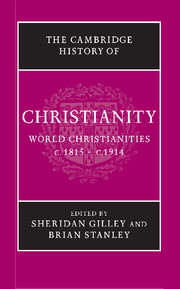Book contents
- Frontmatter
- 1 Introduction
- PART I CHRISTIANITY AND MODERNITY
- 2 The papacy
- 3 Theology and the revolt against the Enlightenment
- 4 The growth of voluntary religion
- 5 Catholic revivalism in worship and devotion
- 6 Women preachers and the new Orders
- 7 Church architecture and religious art
- 8 Musical trends and the western church: a collision of the ‘ancient’ and ‘modern’
- 9 Christianity and literature in English
- 10 Christian social thought
- 11 Christianity and the sciences
- 12 History and the Bible
- 13 Popular religion and irreligion in countryside and town
- PART II THE CHURCHES AND NATIONAL IDENTITIES
- PART III THE EXPANSION OF CHRISTIANITY
- Select General Bibliography
- Chapter Bibliography
- Index
- References
5 - Catholic revivalism in worship and devotion
from PART I - CHRISTIANITY AND MODERNITY
Published online by Cambridge University Press: 28 March 2008
- Frontmatter
- 1 Introduction
- PART I CHRISTIANITY AND MODERNITY
- 2 The papacy
- 3 Theology and the revolt against the Enlightenment
- 4 The growth of voluntary religion
- 5 Catholic revivalism in worship and devotion
- 6 Women preachers and the new Orders
- 7 Church architecture and religious art
- 8 Musical trends and the western church: a collision of the ‘ancient’ and ‘modern’
- 9 Christianity and literature in English
- 10 Christian social thought
- 11 Christianity and the sciences
- 12 History and the Bible
- 13 Popular religion and irreligion in countryside and town
- PART II THE CHURCHES AND NATIONAL IDENTITIES
- PART III THE EXPANSION OF CHRISTIANITY
- Select General Bibliography
- Chapter Bibliography
- Index
- References
Summary
Over the course of the nineteenth century, there was a widespread change in the way in which religious commitment was expressed and apparently understood by a majority of observant Roman Catholics. For most of the eighteenth century, all that had seemed necessary to lead what was generally considered to be a devout life was to be baptised; to hear Mass on a Sunday; and to take seriously one’s duties of going to confession and receiving the Blessed Sacrament at least once a year (‘at Easter or thereabouts’ according to the catechism, but by convention some eight times a year, on the greater church feasts). Mainstream Catholic sermons, just like mainstream Protestant ones, stressed above all the reasonableness and morality of the central tenets of Christianity; while religious communities which could not prove themselves to be socially ‘useful’, or which had developed a reputation for excessive attachment to the pope, dwindled in membership and were sometimes forcibly closed down. Biblical miracles, unless considered fundamental to doctrine, tended to be either side-stepped or explained away by Catholic theologians; traditional legends surrounding the lives of the saints were treated with equal fastidiousness, so that St Francis of Assisi, for example, had come to be regarded by the self-consciously enlightened as ‘a harmless enthusiast, pious and sincere, but hardly of sane mind, who was much rather accessory to the intellectual than to the moral degradation of mankind’.
- Type
- Chapter
- Information
- The Cambridge History of Christianity , pp. 70 - 83Publisher: Cambridge University PressPrint publication year: 2005
References
- 1
- Cited by

